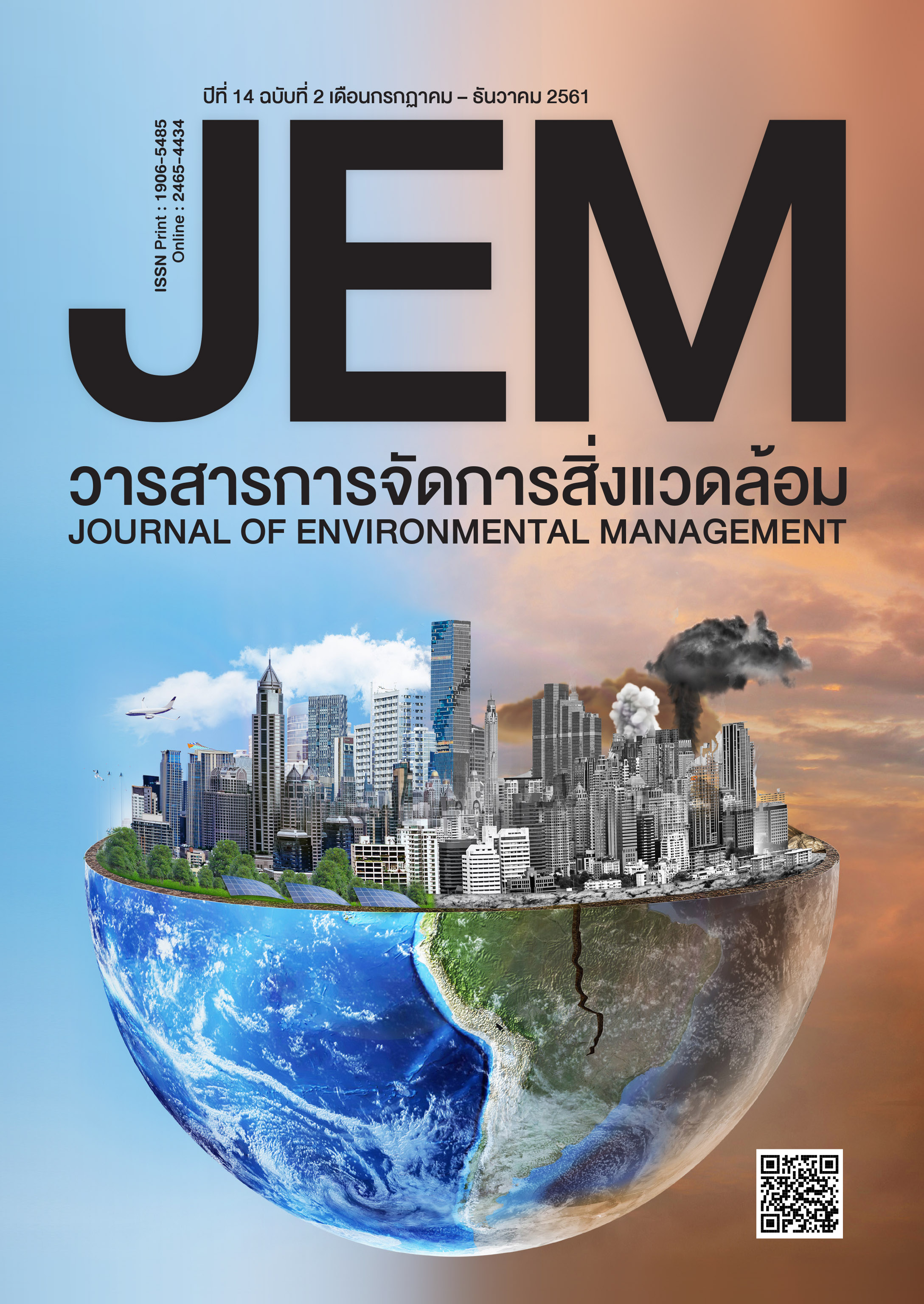ผลกระทบของราคาน้ำมันตกต่ำต่อเศรษฐกิจและปริมาณก๊าซคาร์บอนไดออกไซด์ที่เกิดจากการบริโภคน้ำมันของประเทศไทย จากการพยากรณ์ด้วยแบบจำลองดุลยภาพทั่วไป IMPACTS OF SUSTAINED LOW PETROLEUM PRICE ON THAILAND’S ECONOMY AND QUANTITY OF THE RELEASE OF CO2 RESULTING FROM PETROLEUM CONSUMPTION FROM THE PERSPECTIVE OF FORECASTING COMPUTABLE GENERAL EQUILIBRIUM MODEL
DOI:
https://doi.org/10.14456/jem.2018.11คำสำคัญ:
ราคาน้ำมัน, การเติบโตของเศรษฐกิจไทย, แบบจำลองดุลยภาพทั่วไป, ก๊าซคาร์บอนไดออกไซด์บทคัดย่อ
การผลิตก๊าซธรรมชาติ (Shale gas) และน้ำมันจากหินดินดาน (Shale oil) ของโลกในปริมาณมากเป็นผลให้น้ำมันปิโตรเลียมมีราคาตกต่ำจากเดิมประมาณร้อยละ 50 และทรงตัวต่อเนื่องนับจากปี พ.ศ.2557 และมีความเห็นจากสื่อหลายแหล่งจากมุมมองที่แตกต่างว่าจะมีผลกระทบทางเศรษฐกิจทั้งด้านบวกและลบ บทความวิจัยนี้มีจุดมุ่งหมายเพื่อรายงานผลการศึกษาการเจริญเติบโตทางเศรษฐกิจของประเทศไทยจากมุมมองของการพยากรณ์จากแบบจำลองดุลยภาพทั่วไป (Forecasting computable general equilibrium model) และประเมินปริมาณก๊าซคาร์บอนไดออกไซด์ที่เกิดจากการบริโภคน้ำมันปิโตรเลียม การศึกษาพบว่าราคาน้ำมันตกต่ำก่อให้เกิดปัจจัยบวกสำหรับการเจริญเติบโตของผลผลิตมวลรวมในประเทศที่แท้จริง (Real GDP) ซึ่งเป็นผลให้อุปสงค์น้ำมันปิโตรเลียมมีปริมาณเพิ่มขึ้น โดยพบว่ามีอัตราเติบโตสูงกว่าอัตราเติบโตของผลผลิตมวลรวมในประเทศที่แท้จริง และมีความเห็นว่าการควบคุมปริมาณการเกิดก๊าซคาร์บอนไดออกไซด์ซึ่งเป็นผลจากการเติบโตของอุปสงค์น้ำมันปิโตรเลียม อาจจะเกิดจากนโยบายส่งเสริมการออมเพื่อเปลี่ยนการบริโภคเป็นการระดมทุนสำหรับการพัฒนาโครงสร้างพื้นฐาน ซึ่งก่อให้เกิดผลกระทบวงนอกในการส่งเสริมการลงทุนของเอกชนซึ่งเป็นผลให้ระบบเศรษฐกิจมีศักยภาพในการสร้างรายได้ในอนาคตที่กว้างขวางมากขึ้น
เอกสารอ้างอิง
Dixon, P.B.; Parmenter.; BR.; Sutton,J. and Vincent, DP. 1982. ORANI: A Multisectoral Model of the Australian Economy. North-Holland Publishing Company, New York.
Harrison, W. J. and Pearson, K.R. 2002. An Introduction to GEMPACK. Clayton, Victoria: Monash University.
Horridge, J.M. B.R, Parmenter. and K.R, Pearson. 1993, ORANI-F: A General Equilibrium Model of the Australian Economy, A Journal of the European Economics and Financial Centre, (3) 2, 71-140
Krauss, Clifford 2016. Oil Prices: What’s Behind the Volatility? Simple Economics. Updated December 12, 2016. The New York Times. http://www.nytimes.com/interactive/2016/business/energy-environment/oil-prices.html?_r=0 [20 December 2016]
Lafakis, Chris, Adam Kamins, Edward Friedman, and Dan White 2015. The Economics of Lower Oil Prices. Moody’s Analytics. Online: Available at https://www.economy.com/the-economics-of-lower-oil-prices
Leontief, W.W. (1936). Quantitative input and output relations in the economic system of the United States, Review of Economics and Statistics, 18, 105-125.
Mason, Charles F., Lucija A. Muehlenbachs, and Sheila M. Olmstead 2015. The Economics of Shale Gas Development. Resources for the Future. Online: Available at http://www.rff.org/files/sharepoint/WorkImages/Download/RFF-DP-14-42.pdf [20 December 2016]
Nyquist, Scott and Susan Lund 2016. Shale Revolution: Opportunity To Jump-Start Economic Growth. Forbes. http://onforb.es/1xDyc7f
The Economist 2016. Who’s afraid of cheap oil?. Online: Available at http://www.economist.com/news/leaders/21688854-low-energy-prices-ought-be-shot-arm-economy-think-again-whos-afraid-cheap [20 December 2016]
The Wall Street Journal 2016. Are Low Oil Prices Good for the Economy? Dow Jones & Company. Online: Available at http://www.wsj.com/articles/are-low-oil-prices-good-for-the-economy-1479092581 [20 December 2016]
US Energy Information Administration. 2014. Annual energy outlook 2014, with projections to 2040. EIA. Rep. US Energy Information Administration, Washington, DC. http://www.eia.gov/forecasts/aeo.
Wikipedia 2016. Shale gas. Online: Available at ้https://en.wikipedia.org/wiki/Shale_gas. [20 December 2016]



